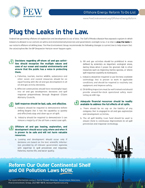Offshore Energy Reform To-Do List
Federal law governing offshore oil exploration and development is out of date. The Gulf of Mexico disaster has exposed a system in which industry is allowed to cut corners on safety and environmental protection and government oversight is lax. It is time to plug the leaks in our nation's offshore oil drilling laws. The Pew Environment Group recommends the following changes to current law to help ensure that the catastrophes like the BP Deepwater Horizon never happen again.
 Decisions regarding off-shore oil and gas activities should recognize the multiple values and uses of our ocean and coastal environments and ensure that the public has a voice in protecting them.
Decisions regarding off-shore oil and gas activities should recognize the multiple values and uses of our ocean and coastal environments and ensure that the public has a voice in protecting them.
- Fisheries, tourism, marine wildlife, subsistence and other ocean and coastal resources should be on equal footing with the oil and gas development in all oil and gas activity decisions.
- Affected communities should have meaningful input into oil and gas development decisions and spill response preparedness through Regional Citizen Advisory Councils.
Offshore oil and gas leasing, exploration, and development should occur only where and when it is proven to be safe and will not harm valuable resources.
- Leasing and development should occur only if decisions are based on the best scientific information provided by all relevant government agencies with expertise in spill prevention and response, fisheries, marine life, and water quality.
- Oil and gas activities should be prohibited in areas defined by scientists as important ecological areas, during times when it poses the greatest risk to other resources such as migrating marine species, or where spill response capability is inadequate.
- Industry should be required to use the best available technology that is proven to work in applicable conditions, and should be required to routinely test equipment and improve safety.
- Oil drilling inspectors must be well trained and should provide around-the-clock operational safety monitoring on drill rigs.
Spill response should be fast, safe, and effective.
- Industry should be required to demonstrate before drilling begins that it has the capability to quickly and effectively stop and clean up an oil spill.
- Industry should be required to demonstrate it can remove a majority of the oil from a worst-case spill.
Adequate financial resources should be readily available to address the full effects of oil spills.
- There should be no cap on the liability of any company that is engaged in oil and gas exploration and development activities.
- The oil spill liability trust fund should be used to ensure there is continuous improvement in oil spill prevention and response technology.
The Pew Environment Group's offshore energy reform work is now a part of Pew's Arctic Ocean Program.



